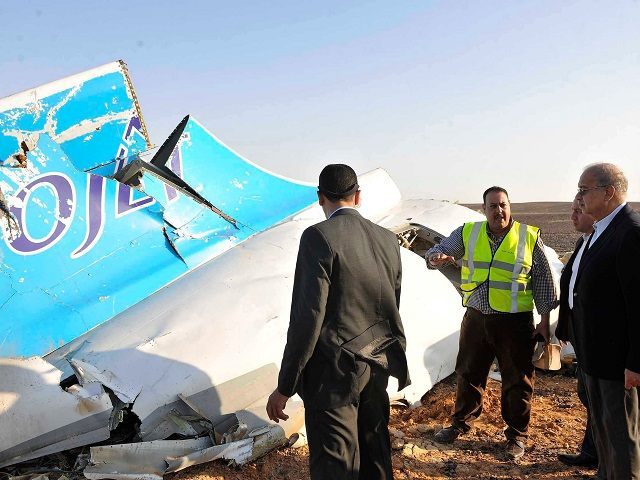Days after Metrojet’s Airbus A321 crashed in Egypt over the Sinai Peninsula, killing all 224 people on board, officials from the airline are now saying the plane was taken down by an “external influence.” The plane, which carried mostly Russian passengers, was flying from a Red Sea resort to St. Petersburg, Russia.
CNN reports than an official from Kogalymavia, the airline running the flight, did not specify what he meant by “external influence.” The report also does not name the official.
This contradicts public statements by both the airline and the Russian government. Alexander Smirnov, an official at the airline, said in a press conference Monday, “We exclude technical problems and reject human error.” Smirnov said there were no warnings from the crew before the crash, which he said indicated that the crew was unable to radio out. Smirnov told reports that the airplane’s “black box” flight and voice data recorders had been recovered but no data had been read yet.
It is the closest that officials have come so far to saying that airline crash may have been an act of terror. Recently, Russia has taken a more aggressive role against ISIS in Syria, and an ISIS affiliate claimed credit for the crash.
Without hard data, theories abound. Michael Clarke, the director general of the Royal United Services Institute told the BBC, “Early reports said that [the aircraft] split into two and that suggests a catastrophic failure, not a mechanical failure, but that suggests perhaps an explosion on board.”
On Twitter, Brookings Institution fellow Charles Lister said he did not believe ISIS could hit a plane at that altitude with the weapons they have.
PTs: The most advanced anti-air weapon #ISIS has is SA-18 Igla MANPADS, which can reach 10,000ft – way below altitude of #Russia airliner.
— Charles Lister (@Charles_Lister) October 31, 2015
Previous reports indicated all signals coming from the plane stopped at once. As the website FlightRadar24 reported:
At approximately 04:13 UTC, 31 October 2015, Metrojet flight 9268 crashed into the Sinai Peninsula. The flight’s planned route was from Sharm el-Sheikh to St. Petersburg, Russia. We acquired a signal from the aircraft shortly after takeoff and tracked it until 04:13:22 UTC. At the time of last contact we were receiving a signal from the aircraft to three of our receivers, all of which stopped receiving data from the aircraft at the same time.
On Fox Business, retired Lt. Col. Ralph Peters said, “If it were terrorism (…) it would not only be revenge and embarrassing Putin and challenging his narrative of invincibility but it would also be kicking Egypt, too.” Peters pointed out that the Egyptian government has been cracking down on terrorism and the crash would also hurt Egypt’s already ailing tourism industry.
However, Russian officials appear to moving cautiously about characterizing the incident. At a Monday press conference, President Vladimir Putin called the incident a tragedy and expressed condolences to the victims’ families but also said “everything should be done so that an objective picture of what happened is created, so that we know what happened.”
Some key Russian officials have downplayed the possibility of foul play. Russia’s transport minister Maksim Sokolov said that the involvement of ISIS “can’t be considered accurate,” and Russia’s top aviation official Alexander Neradko took the airline to task, saying that their comments were “premature and not based on any real facts.”
Many airlines have announced they will not fly over Sinai, citing fears of terrorism.

COMMENTS
Please let us know if you're having issues with commenting.